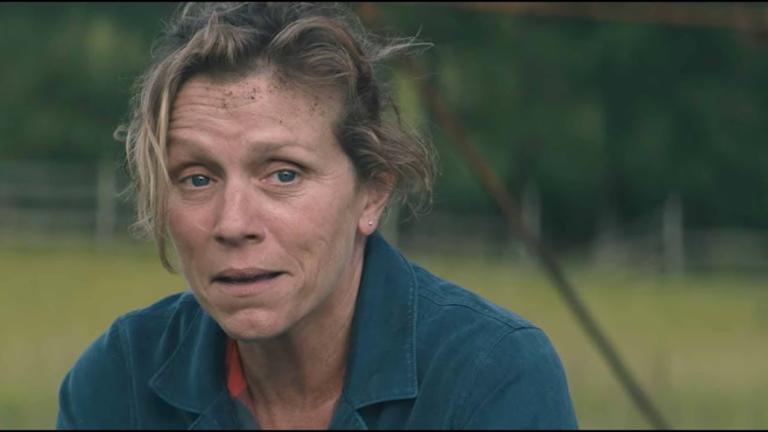
Chief Willoughby brings that love from beyond the grave—a twist that carries with it a nice Christian echo in it, if you’re inclined to look for such things. He writes letters to several people after he dies—to his wife, to Mildred and, most importantly, to Dixon. Though he’s been fired from the police force for throwing Red out a window, he sneaks into the police station to read it … just as Mildred begins throwing Molotov cocktails at the place. And as the fire begins to lick the walls, Dixon continues to read, as if spellbound. In part, here’s what it says:
I think you’ve got the makings of a really good cop, Jason, and you know why? Because, deep down, you’re a decent man. I know you don’t think I think that, but I do … I do think you’re too angry, though, and I know it’s all since your dad died and you had to go look after your mom and all.
But as long as you hold on to so much hate then I don’t think you’re ever going to become what I know you want to become: a detective. ‘Cause you know what you need to become a detective? … Love. Because through love comes calm, and through calm comes thought. And you need thought to detect stuff sometimes, Jason. It’s kinda all you need.
From that moment, Dixon becomes a different person. He thinks. When he notices the fire burning all around him, he thinks to save Angela Hayes’ case file, When, by happenstance, he comes across a couple of possible suspects, he thinks about how he can gather evidence from them. Ironically, when Dixon’s no longer a cop, he becomes a much better one.
We see other moments of tenderness and beauty, too—signs that the only thing that can truly heal rage and hate is through showing love and kindness.
Biblically, there’s a place for righteous anger, even hate. We’re all supposed to hate the things that God does. But we’re reminded that hate and rage can be terrible, ungodly things, too.
1 John spends plenty of time talking about this very thing: “Whoever says he is in the light and hates his brother is still in darkness,” we read in its second chapter. “Whoever loves his brother abides in the light, and in him there is no cause for stumbling. But whoever hates his brother is in the darkness and walks in the darkness, and does not know where he is going, because the darkness has blinded his eyes.”
For much of the movie, both Mildred and Dixon walk in darkness. They’re blinded by their own personal pain and grief and shame. They cannot see. They cannot think. I like how Andrea Gronvall of the Chicago Reader puts it: “Three Billboards Outside Ebbing, Missouri tells the story of a woman emulating God’s vengeance when she might profit more by emulating his forgiveness, especially toward herself.”
Three Billboards makes no promises that Mildred and Dixon will ever be able to set aside their rage. They exile themselves by the time the credits roll, both feeling unsuited to participate in the work of loving and caring for their own families. But that suggests that they’re thinking, too—acting more sacrificially than selfishly, even if their end goals are still problematic. And their final conversation holds out hope, I think, that they can set aside their rage, move past their pain and find more reason to live than a sense of fiery justice or revenge.
Yes, Three Billboards Outside Ebbing, Missouri, is an angry movie—as angry a movie as I’ve seen. But in the midst of that rage, the movie offers a strong rebuttal to its own anger, suggesting that love is the better way forward.












